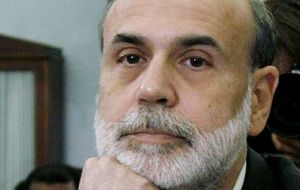MercoPress. South Atlantic News Agency
Bernanke Warns White House About Failure to Reduce Federal Budget Deficit
 US Federal Reserve chairman Bernanke
US Federal Reserve chairman Bernanke Federal Reserve Chairman Ben S. Bernanke said a failure to reduce the federal budget deficit may push up interest rates over time and impair economic growth, putting the recovery at risk.
“Achieving long-term fiscal sustainability will be difficult, but the costs of failing to do so could be very high,” Ben Bernanke said in remarks prepared for a speech Tuesday to a White House commission on the budget deficit.
“Increasing levels of government debt relative to the size of the economy can lead to higher interest rates, which inhibit capital formation and productivity growth—and might even put the current economic recovery at risk.”
The Obama administration estimates budget deficits will total 5.1 trillion US dollars over five years and hit a record 1.6 trillion in the year ending next September 30. The 1.4 trillion US dollars deficit in 2009 was equal to 9.9% of GDP, the largest share since the end of the World War II.
Bernanke spoke to the National Commission on Fiscal Responsibility and Reform, established by President Barack Obama to identify policies to reduce the deficit to a sustainable level. The commission's mandate is to propose a plan to balance the budget, except for interest payments on debt, by 2015.
“High levels of debt also decrease the ability of policy makers to respond to future economic and financial shocks,” Bernanke said. ”A loss of investor confidence in the ability of a government to achieve fiscal sustainability can itself be a source of significant economic and financial instability”, he added.




Top Comments
Disclaimer & comment rulesCommenting for this story is now closed.
If you have a Facebook account, become a fan and comment on our Facebook Page!